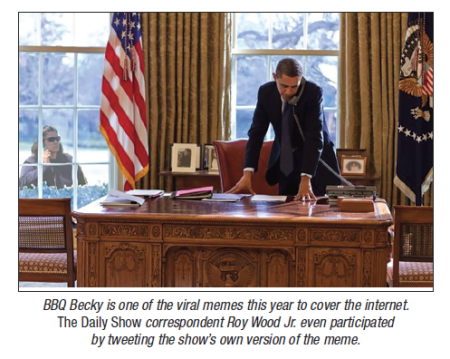Pardon Meme
In addition to providing an interesting view of our world, memes also have altered the way we communicate and relate to each other. It is not uncommon to see a string of social media comments or text messages that consist entirely of memes. Internet memes convey emotions visually and more quickly than paragraphs of text, which is perfect for the rapid communication our handheld devices demand of us.
Social media in general has encouraged us to simply “like” a comment as opposed to articulating why we like it. An individual can simply post a funny meme to convey his or her emotion online instead of articulating any further or in a more sincere manner. In addition, individuals use memes to smooth over online comments that have been taken the wrong way or to lighten the mood when internet discussions enter into serious, idealistic debates.
Sometimes when a message thread gets too intense, some one will post a meme of a cute animal to lighten the mood and decrease tensions. In other cases, the meme will be sent to mock or insult the commenter’s stance or argument, thus escalating tension rather than diffusing it. Whether used in a constructive or negative manner, internet memes are part of the social media communication landscape.
 While memes often feature celebrities and internet stars, sometimes ordinary people accidentally become the subject of memes, as in the case of BBQ Becky. Her video and image quickly turned into the latest viral meme to burn up social media (“BBQ Becky: Woman Photoshopped Into Black History After Barbecue Complaint,” May 18, 2018; bbc.com/news/newsbeat-44167760). She is not the only individual to experience this fate. Random photos or often controversial alterca tions between people captured and posted on social turn into memes often without the consent of everyone involved. In her 2014 blogpost “My Face Is a Viral Meme,” Helene Sula describes how a photo of her crying about a poor dye job at a hair salon turned into a conservative attack meme on Obamacare without her consent: “It seems that as a society, we’re blasting out information without too much concern as to whether it’s wrong, right or even misspelled” (heleneinbetween.com/2014/03/my-face-is-viral-meme.html).
While memes often feature celebrities and internet stars, sometimes ordinary people accidentally become the subject of memes, as in the case of BBQ Becky. Her video and image quickly turned into the latest viral meme to burn up social media (“BBQ Becky: Woman Photoshopped Into Black History After Barbecue Complaint,” May 18, 2018; bbc.com/news/newsbeat-44167760). She is not the only individual to experience this fate. Random photos or often controversial alterca tions between people captured and posted on social turn into memes often without the consent of everyone involved. In her 2014 blogpost “My Face Is a Viral Meme,” Helene Sula describes how a photo of her crying about a poor dye job at a hair salon turned into a conservative attack meme on Obamacare without her consent: “It seems that as a society, we’re blasting out information without too much concern as to whether it’s wrong, right or even misspelled” (heleneinbetween.com/2014/03/my-face-is-viral-meme.html).
While we feel more sympathy for some individuals becoming memes more than others, it is disconcerting to know that one image has the potential to go viral and alter someone’s life permanently. For internet memes, there is no difference between whether the subject wants to become one or the reason why he or she has become a meme: The only constant is the desire to reblog and reach as many individuals as possible and this process occurs at unforgiving speeds in the age of information. For individuals like Sula, it has serious implications; others parlay their internet meme stardom into careers. Danielle Bregoli, aka Cash Me Ousside Girl, is a member of the latter group of average people turned into memes. After appearing on the Dr. Phil show and becoming a viral internet meme with her catchphrase “Cash me ousside,” Bregoli took her fame and transferred it into a budding rap career. She is currently on tour as well as nominated for a Billboard Music Award (“Bhad Bhabie Talks Viral Success, Kodack Black Rumours & Using Haters as Inspiration,” Kathy Iandoli, Dec. 26, 2017; billboard.com/articles/columns/hip-hop/8078673/bhad-bhabie-interview-viral-success-dr-phil-record-deal).
Slam, Bam, Thank You Meme
We are communicating and absorbing information at record speeds, but we are not retaining or evaluating this infor mation properly. The same can be said for interacting with each other online. Is sending a funny meme to a friend who needs a pick-me-up really the same as being there in person? Internet culture has done wonders to bring people within much closer reach, and we are communicating with each other much more, but it does not encourage sincerity in these interactions with others.
Internet memes, as humorous, amusing, and harmless as they appear, are packed with implications about our modern world. Memes are shared and created to easily articulate and communicate complex emotions to others in a digitally saturated world. During these strange times, they are an outlet of expression for us all. However, as we adapt to this new form of communication, what are we leaving behind as a result? Will carefully crafted sentences in messages to our friends survive the world of group chats and online comment section threads? The answer is unclear, but is littered with many cute animals and dancing babies available for us to articulate our thoughts for years to come.